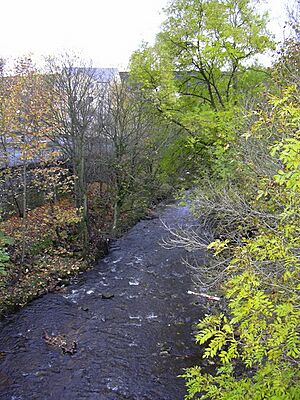Colne Water facts for kids

Colne Water is a small but important river in eastern Lancashire, England. It flows for about 5 miles (8 kilometers) and helps drain a large area of land. This river is a key part of the local landscape and history.
Contents
Colne Water: A Lancashire River
Colne Water is a river that flows through the beautiful countryside of eastern Lancashire. It's not a huge river, but it plays a big role in the area. The river's journey is quite interesting, starting from small streams and growing as it goes.
Where Does Colne Water Begin?
The adventure of Colne Water begins near a place called Laneshaw Bridge. Here, two smaller streams, the River Laneshaw and Wycoller Beck, meet at Covey Bridge. This meeting point is where Colne Water officially forms.
The River's Early Journey
From Covey Bridge, the river starts flowing west. It soon picks up another stream called Trawden Brook near the village of Cottontree. As it continues, it heads straight for the town of Colne.
Colne Water's Path Through Town
As Colne Water reaches the town of Colne, it flows through the southern part of the valley. It passes under some important structures and meets more streams.
Landmarks Along the Way
In the Waterside area of Colne, the river meets Church Clough Brook. It then flows under a big viaduct that carries the East Lancashire railway line. Soon after, it goes under the A56 Burnley Road at Primet Bridge.
Joining More Streams
After passing these landmarks, Colne Water is joined by Guy Syke at Greenfield Bridge. It then flows past the town's sewage works. As it leaves Colne, it collects Wanless Water and Swinden Clough. Just before it goes under the Leeds and Liverpool Canal, it's almost at its end.
Where Colne Water Ends
Colne Water's journey finishes when it joins Pendle Water. This happens in the Lowerford area of Barrowford, right after passing under the M65 motorway bridge.
What's in a Name?
The name "Colne" is very old. It might come from an ancient British language, but its exact meaning is not clear. It's believed that the town of Colne actually got its name from this river. The word "Water" is a common old English word for a stream or river, especially in places like southern Scotland.
 | Janet Taylor Pickett |
 | Synthia Saint James |
 | Howardena Pindell |
 | Faith Ringgold |

